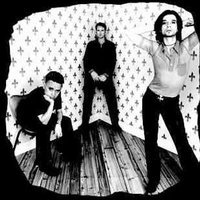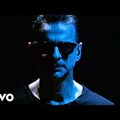"KEYBOARD WARRIORS -
ELECTRO-ROCK VETERANS COME OUT FIGHTING ON IRATE 14TH ALBUM :
THEY SOUND AS IF THEY’VE BEEN RATTLED BY THE WORLD’S CURRENT CRITICAL CONDITION.
Even when thundering the world’s stadia with their storm-cloud synthrock, Depeche Mode have always managed to make themselves feel like a private vice. They could be relied upon to offer a transgressive frisson, deviating from norms with their domineering “specialist” electronics. From the explicit power plays of Master And Servant and Stripped to the dark star-fan bonding of Personal Jesus, they have been skilled at making it seem as if their black celebration was an intimate communion between them and their audience. As one fan said when interviewed for 2013 tour DVD Live In Berlin, “it’s my religion.”
There have been moments, though, when they have pulled back the curtain on the rock-confessional and confronted the wider world. Their 1983 album Construction Time Again featured The Landscape Is Changing and Two Minute Warning: People Are People tried to pour a more general balm on the human condition, while John The Revelator, from 2005’ s Playing The Angel, cryptically stalked a post-Iraq War moral desert looking for justice. Even so, a darkened interior has always been their safest space.
Around the release of their last album, 2013’ s Delta Machine, Dave Gahan declared that “politics doesn’t really come into music for us.” That caginess is obliterated pretty quickly with Spirit, a record that suggests that even the impervious megalith that is Depeche Mode has been rattled by the world’s current critical condition.
The opening doomy judder of Going Backwards offers the whole of humanity out – “We’re going backwards/To a caveman mentality” – not so much I Feel You as I See You.
Hot on its heels is grinding call-to-arms Where’s The Revolution, where Gahan declares, “Come on people, you’re letting me down.”
Fail, sung by the band’s central nervous system, Martin Gore, is even more explicit: “Our conscience is bankrupt, we’re fucked.”
If Depeche Mode haven’t always escaped bombast, here their sound is largely sharpened and polished by their unmistakable anger. The firebrand rabble-rousing admittedly falls short with Poorman, a lumpen critique of trickle-down economics mismatched with a wipe-down grind, a song ultimately scuppered by a calamitous rhyme scheme (“Got the blues”, “worn-out shoes” and so on).
Subtler is the police-state imagery of The Worst Crime, knotting a noose of complicity and guilt round the listener listener’s s neck. Companion pieces Eternal and the wheezy gasp of Cover Me offer a more speculative take on global collapse, sci-fi lullabies pointing to Gahan’s love for David Bowie.
Happily, there are also flashes of seductive musical perversity, a gleeful aesthetic drive that stops the grim mood becoming too hectoring or leaden. It’s hard to find any great moral outrage in the enjoyably filthy You Move, but the distorted rage of Scum is palpable, sounding like it’s going to cough up Erasure’s Ship Of Fools in a puddle of bile.
Even better is So Much Love, its apparent hands-across-the-ocean sentiment undermined by Gahan’s priapic vocal and an ominous industrial clank and scree echoing their early-’ 80s Einstürzende Neubauten fixation.
By engaging so boldly with the world around them, though, Depeche Mode have shed some of the electropreacher bloat accumulated over their long career, leaving them sounding dynamic, galvanised and – remarkably, after all this time – hungry to make their mark. Once again, they make everything count.
(4 stars out of 5)
VICTORIA SEGAL"





